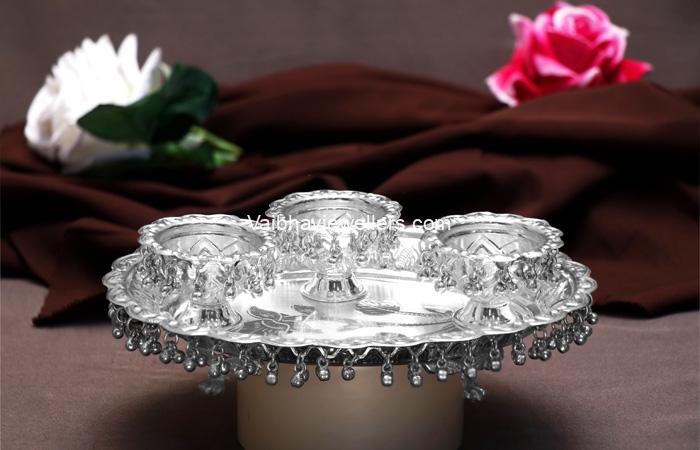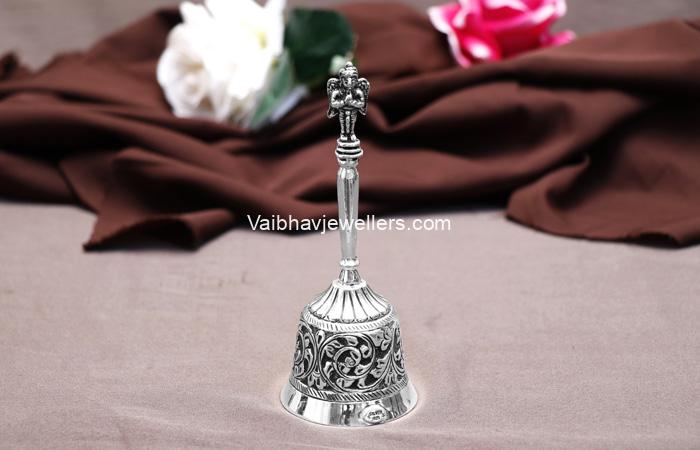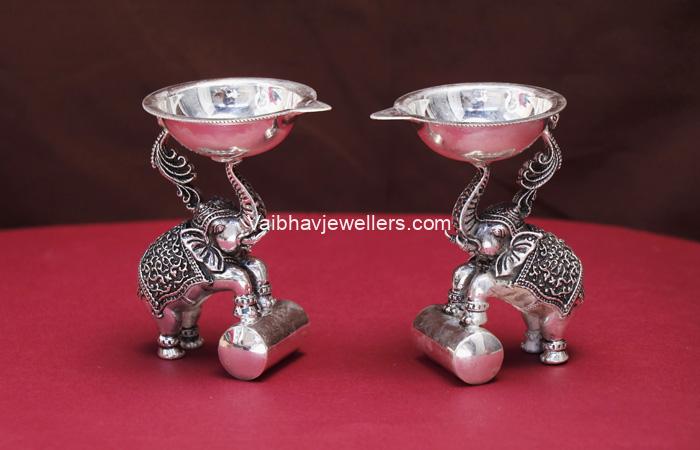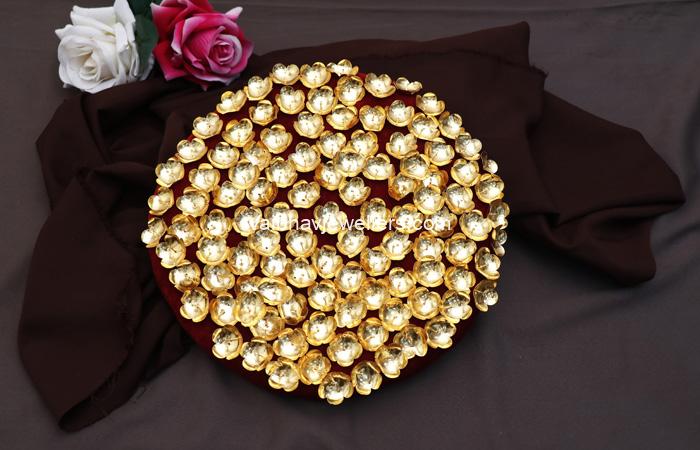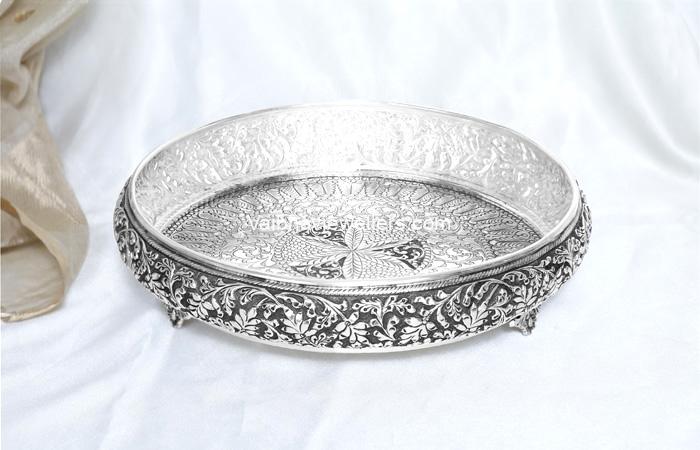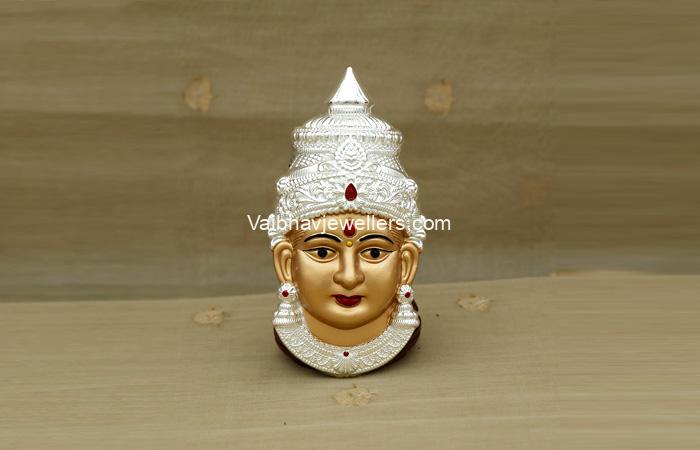
South Indian Silver Pooja Articles
Silver Plain Nagash Lakshmi Devi Face
Aug 9, 2023
The Silver Plain Nagash Lakshmi Devi Face is a stunning representation of the goddess…
Vaibhav Jewellers Silver Nagash Muvva Plates
Aug 9, 2023
These Silver Nagash Muvva Plates from Vaibhav Jewellers are beautifully crafted, showcasing intricate designs…
Vaibhav Jewellers Antique Silver Embossed Bell
Aug 9, 2023
This Antique Silver Embossed Bell from Vaibhav Jewellers is a stunning representation of traditional…
Vaibhav Jewellers Antique Silver Embossed Single Nose Kundulu
Aug 9, 2023
This Antique Silver Embossed Single Nose Kundulu from Vaibhav Jewellers showcases exquisite craftsmanship. Featuring…
Vaibhav Jewellers Silver Gold Palting 110 Pooja Flowers
Aug 9, 2023
This Silver Gold Plating 110 Pooja Flowers from Vaibhav Jewellers is a beautiful representation…
Vaibhav Jewellers Silver Antique Embossed Pooja Plate
Aug 9, 2023
This Silver Antique Embossed Pooja Plate from Vaibhav Jewellers is a stunning representation of…
Introduction
Shimmering with divine grace and timeless elegance, silver pooja articles have been an integral part of Indian tradition for centuries. As the gentle glow of the sacred lamp illuminates the altar, these meticulously crafted treasures elevate the spiritual experience to celestial heights. Symbolizing purity, spirituality, and auspiciousness, silver holds a revered place in Hindu rituals. From intricately designed lamps to ornate utensils and divine idols, these silver artifacts enchant devotees and art enthusiasts alike. With their radiant beauty and cultural significance, silver pooja articles are not merely objects of worship but a testament to India’s rich heritage and deep-rooted traditions.
Over the past few years, there has been a notable surge in demand for Indian silver pooja items. These items are highly valued for their exceptional artistry and cultural importance. This blog post will examine the appeal of silver pooja articles within the context of India, especially South Indian tradition, and analyze the factors contributing to their increasing popularity in the United States.
Significance of Silver Pooja Articles in South Indian Tradition
- Spiritual Symbolism: Silver is considered a sacred metal in South Indian tradition, symbolizing purity, spirituality, and auspiciousness. It is believed to possess divine qualities and is associated with the moon, representing tranquility and grace. Silver in pooja articles elevates the sanctity of the rituals and creates a sacred atmosphere.
- Ritualistic Importance: Pooja ceremonies in South India are characterized by meticulous attention to detail and adherence to traditional practices. Silver pooja articles are an integral part of these rituals, with each item serving a specific purpose. From lamps (deepams) to incense holders (agal vilakku), from utensils (kuthuvilakku) to idols (deities), silver is used to create and adorn these articles, enhancing the spiritual experience.
- Divine Connection: Silver pooja articles are believed to attract positive energy and create a communication channel with the holy. The silver items are considered sacred vessels that hold offerings and prayers during the worship process. They act as conduits between the worshipper and the deity, facilitating a deep sense of devotion and connection.
- Aesthetic Appeal: The craftsmanship and beauty of silver pooja articles are admired by devotees and art enthusiasts. Skilled artisans meticulously handcraft these items, showcasing intricate designs, motifs, and detailing. The aesthetic appeal of silver adds elegance and grandeur to the pooja space, creating a visually captivating environment for worship.
- Generational Heritage: Silver pooja articles often hold a special place in families, being passed down through generations as treasured heirlooms. These articles carry the memories and blessings of ancestors, creating a sense of continuity and tradition. They serve as tangible reminders of family heritage and cultural values, strengthening the bond between past and present.
- Economic and Environmental Factors: Silver is a valuable metal with inherent antibacterial properties. Using silver utensils in pooja ceremonies helps maintain hygiene and preserves the sanctity of the offerings. Additionally, silver is known for its durability and resistance to corrosion, ensuring that these articles can be used for a long time, thereby reducing waste and promoting sustainability.
Silver Pooja Articles Designs
As mentioned above, South Indian silver pooja items encompass many types, each distinguished by its unique design and purpose. Skilled artisans meticulously crafted these articles, showcasing exquisite patterns, motifs, and detailing. Let’s explore some of the prominent types of silver pooja articles in South Indian tradition and their captivating designs:
- Silver Lamps (Deepams): The deepam, or lamp, holds immense significance in pooja ceremonies. Silver lamps are crafted in various forms, such as the traditional KuthuVilakku and Nilavilakku. These lamps feature intricate engravings depicting divine figures, floral patterns, and geometric designs. The flickering flames dancing atop these silver lamps create an enchanting ambiance, symbolizing the illumination of knowledge and spiritual enlightenment.
- Silver Idols (Deities): Silver idols of deities are revered as focal points in pooja rooms and temples. These idols are crafted with utmost precision, capturing the divine essence of the worshipped deities. The intricate detailing brings the idols to life with ornate crowns, jewelry, and divine attributes. The silver surface reflects the devotion of the artisans, with delicate features and embellishments that inspire reverence and faith.
- Silver Utensils: Silver utensils are used for various pooja rituals, including offering prasadam (sacred food) and performing holy ablutions. These utensils are designed to be both functional and visually appealing. Examples include the Panchapatra (sacred water vessel), Achmani (water spoon), and Kamandalam (water pot). The silver surfaces of these utensils often feature intricate etchings, floral motifs, and auspicious symbols, elevating the act of offering and sanctifying the ritual.
- Silver Accessories: Besides lamps, idols, and utensils, South Indian tradition embraces silver accessories for pooja ceremonies. These accessories include silver bells, conch shells, and incense holders. Silver bells emit a melodious sound when rung, inviting divine presence and warding off negative energies. Conch shells are intricately carved and hold sacred significance in Hindu rituals. Incense holders, known as Agal Vilakku, feature beautiful cutwork patterns that allow the fragrant incense to diffuse, filling the air with divine aromas.
- Silver Pooja Thalis: Pooja thalis, or trays, present offerings to deities during worship. Silver pooja thalis are adorned with detailed designs and patterns, showcasing the skill and artistry of the artisans. These thalis may feature auspicious symbols like the Om symbol, lotus motifs, or representations of deities. The silver surface adds a touch of grandeur to the offering, creating a visually captivating presentation.
Creating a Serene Ambiance: Decorating Your Pooja Room with Silver Pooja Items
Decorating your pooja room with silver pooja items can add a touch of elegance and sacredness to the space. Here are some tips on how to effectively decorate your pooja room with silver pooja items:
- Identify the focal point: Choose a prominent spot in your pooja room to create a focal point. It could be a wall shelf, a dedicated altar, or a small table. Place a silver idol of your preferred deity as the centerpiece to attract attention and create a spiritual ambiance.
- Silver lamps: Add silver lamps (dreams) to your pooja room. These lamps not only provide illumination but also serve as decorative pieces. Place them strategically around the altar or on the sides of the deity idol. Opt for intricately designed silver lamps to enhance the visual appeal.
- Utensils and accessories: Include silver utensils and accessories in your pooja room. Silver bowls, plates, and cups can offer fruits, flowers, and prasadam (sacred food). Silver incense holders and bells can add a touch of charm to the space. Ensure that these items are clean and polished regularly to maintain their shine.
- Pooja thalis: Consider using silver pooja thalis for presenting offerings during rituals. These thalis can hold sacred items like vermillion, rice, and sacred thread. Opt for silver thalis with ornate designs or engravings that align with your personal preferences.
- Decorative accents: Complement the silver pooja items with additional decorative accents. You can place fresh flowers or flower garlands around the altar. Consider adding a backdrop or wall hanging with silver accents or motifs to create a visually appealing background.
- Lighting: Pay attention to the lighting in your pooja room. Use soft, warm lighting to create a serene atmosphere. Consider installing small LED lights or spotlights to highlight the silver pooja items and create a magical glow.
- Cleanliness and organization: Regularly clean and polish the silver pooja articles to maintain shine and prevent tarnishing. Keep the pooja room well-organized and clutter-free, ensuring each item has its designated place. It will create a sense of harmony and reverence in the space.
Remember, while decorating your pooja room with silver pooja items, it is essential to respect the cultural and religious significance attached to them. Ensure you follow the traditional practices and rituals associated with the items, seeking guidance from elders or priests if needed. With careful placement and thoughtful selection, your pooja room will be transformed into a sacred haven adorned with the timeless beauty of silver pooja items.

